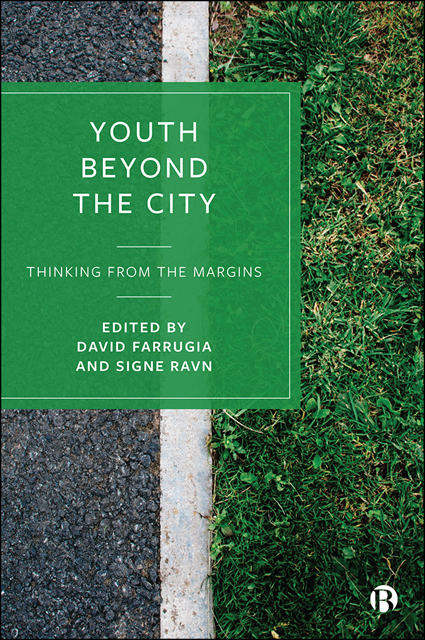Book contents
- Frontmatter
- Contents
- List of Figures and Tables
- Notes on Contributors
- Introduction: Thinking from the Margins
- Part I Inequalities: Education and Aspiration on the Margins
- Part II Materialities: Spatiality and Sensory Embodiment
- Part III Identities: Mobility, Rootedness and Belonging
- Part IV Temporalities: Historicizing Space and Place
- Index
4 - Reimagining Space, Reorganizing Lives: Environmental Activism in Myanmar
Published online by Cambridge University Press: 13 October 2022
- Frontmatter
- Contents
- List of Figures and Tables
- Notes on Contributors
- Introduction: Thinking from the Margins
- Part I Inequalities: Education and Aspiration on the Margins
- Part II Materialities: Spatiality and Sensory Embodiment
- Part III Identities: Mobility, Rootedness and Belonging
- Part IV Temporalities: Historicizing Space and Place
- Index
Summary
Introduction This chapter discusses the significance of place for young people from marginalized, agrarian populations in the nascent democracy of Myanmar (formerly Burma) in South-East Asia, and makes visible new social practices based on material factors of land, labour and food. It provides examples of embodied activism emanating from young adults throughout the country, highlighting the local, emplaced ways in which they are responding to the macro-level processes shaping their young lives. The insecurities within global capitalism faced by all contemporary young people are magnified for these youth, who are positioned in declining agricultural communities and degraded environments. The young people in this study are being affected by spaces of extreme poverty and violence (structural, cultural and direct), but also ones of unprecedented opportunity and social and political capital. Determined to protect their land and communities, they are engaged in alternative development practices embedded in the ecologically sustainable practices of permaculture and organic agriculture, together with environmental adult education (EAE) and activities relating to social and environmental justice. Now part of global communities of interest, they are forming new relationships and mobility. This chapter argues that, through their political and social agency, these young people in Myanmar (like others around the world) are vanguards of new forms of social life and connection to place, providing key signposts for global social transformations.
Background
Myanmar is home to a deeply traditional, primarily rural, ethnically diverse and relatively young population of around 53 million. Young people aged 15 to 35 comprise nearly 40 per cent of the population, with the average national age around 27– 28 years of age. Within the country there are 135 officially recognized ethnic groups falling under eight major categories and this diversity has resulted in decades of inter-ethnic and centre/ periphery conflict (Fink, 2001; Callahan, 2003) which continues in some areas today (Subedi and Garnett, 2020). Myanmar has a dynastic history and is socially hierarchical and stratified with very clear class cultures located in geographical spaces. Social division and relationships of domination and subordination are evident, and overall rural populations are marginalized and weakened due to their peripheral geography, distance from the ‘state’, and social status (Jones, 2014). Theravada Buddhism is integral to its society and culture, permeating the government and the majority of people's lives and values (Schober, 2010).
- Type
- Chapter
- Information
- Youth beyond the CityThinking from the Margins, pp. 77 - 95Publisher: Bristol University PressPrint publication year: 2022



